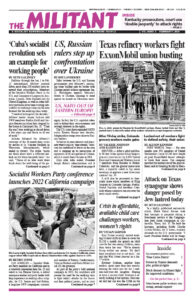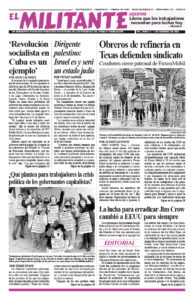Talks between the U.S. and Russian governments over Moscow’s continuing troop buildup near its border with Ukraine ended without agreement Jan. 21. Washington opposes Moscow’s threats to Ukraine, claiming to stand against an assault on Ukrainian sovereignty. In fact, the U.S. capitalist rulers seek to defend their own economic and strategic interests in the region.
The U.S. rulers have expanded NATO across Eastern Europe over decades, bringing these troops ever closer to Russia’s borders.
To bolster its own interests and dominate what it calls its “near abroad,” Moscow has mobilized its forces in the area and is stepping up its persecution of opponents of its occupation of Crimea, which it seized from Ukraine in 2014.
Days after talks ended, President Joseph Biden’s administration said it may deploy up to 8,500 more troops to Eastern Europe, while Washington has carefully limited its direct military aid to Ukraine. NATO announced it was sending more ships to the Baltic, Black and Mediterranean seas Jan. 24, as well as fighter jets to Lithuania and Bulgaria.
More than 70,000 U.S. troops are stationed in Europe, roughly 6,000 of them in Eastern Europe. Other imperialist powers also have thousands of troops on rotating deployments in NATO’s eastern zone.
At the talks in Geneva, Secretary of State Antony Blinken threatened Russian Foreign Minister Sergey Lavrov that any Russian “aggression” against Ukraine would be “met with a severe and united response.”
However, Biden told the press Jan. 19 that a “minor incursion” into Ukraine by Moscow’s forces would be met with only a limited reaction from Washington. The next day, Ukrainian President Volodymyr Zelensky angrily replied, saying there were “no minor incursions” on small nations that don’t carry dangerous consequences.
The exchange underscores the fact that the U.S. rulers have no intention of being drawn into a military conflict with Moscow over Ukraine. At the same time, they want to act in such a way that they don’t lose credibility in a regime they hope to maintain their interests in. They also face growing differences with allied governments in Europe over how to respond to Moscow’s threats.
2014 popular uprising in Ukraine
In 2014 a popular uprising in Ukraine overthrew the pro-Moscow government of Viktor Yanukovych. Without a revolutionary working-class leadership, power fell to Ukrainian capitalists wanting to shift relations to imperialist powers in the West.
Washington is trying to win its allies to join in threatening financial sanctions if Moscow invades. French President Emmanuel Macron proposed Paris lead a European Union delegation to hold separate talks with Moscow. Despite their NATO membership, governments in the EU took no part in recent Washington-led NATO talks.
Moscow’s military strength on the Russia-Ukraine and Belarus-Ukraine borders has now reached 120,000 troops. The Russian government denies it plans to invade Ukraine, while insisting Washington rule out ever admitting Ukraine into NATO. Moscow calls on NATO to remove all its forces from Romania, Bulgaria and other ex-Soviet bloc states in Eastern Europe. Washington rejects all of Moscow’s demands.
The Russian rulers want to reassert their domination over what they call “historical Russia,” including nations that became independent after the collapse of Stalinist regimes in the former Soviet Union in 1991.
After the 2014 Maidan uprising in Ukraine, the Kremlin intervened to arm pro-Russian separatists in eastern Ukraine who took control over areas of Donbas and Luhansk bordering Russia. The smoldering conflict has displaced over 2 million Ukrainians and killed more than 14,000 people.
Tatars fight Russia’s occupation
As part of the 2014 uprising that brought down the Yanukovych regime and opened up political space for working people, over 10,000 people in the Crimean Peninsula demonstrated their support for Ukrainian unity and Crimean autonomy. But in a blow to Ukrainian sovereignty, Moscow used its military to take over and occupy Crimea, home of the Tatar people. It has been persecuting them ever since.
Moscow banned the Mejlis, the Crimean Tatar assembly. The Federal Security Service (FSB), Russia’s political police, raided homes, mosques and schools.
Among five Crimean Tatars arrested for alleged “sabotage” in September 2021 was Nariman Dzhelyal, the first deputy head of the Mejlis. He had just returned to Crimea after participating in the inaugural meeting of Crimea Platform in Ukraine. It seeks international backing for an end to Moscow’s intervention.
“If we wish to live in freedom,” said Dzhelyal in a statement issued through his lawyers Nov. 8, “and determine our fate, there is no other choice than to fight.”
The Kharkiv Human Rights Protection Group in Ukraine reported Jan. 18 that Russian prosecutors are also seeking sentences of up to 18 years in prison for five Tatars arrested last year on trumped-up terrorism charges.
In 2020 Refat Chubarov, head of the Mejlis, was tried in absentia. Having opposed Russian occupation, he was forced into exile. Longtime Crimean Tatar leader Mustafa Dzhemilev was also tried in absentia in 2014.
Crimea was conquered by the Russian czars in 1783. After the Bolshevik-led Russian Revolution brought to power a workers and farmers government in 1917, Tatars established an autonomous republic, as did Ukrainians. National pride grew and culture flourished.
But a bloody counterrevolution carried out by a bureaucratic caste headed by Joseph Stalin drove working people from political power in the late 1920s. It reversed the course fought for by Bolshevik leader V.I. Lenin of championing the rights of oppressed nations to self-determination.
In 1944 Stalin ordered the mass deportation of Crimea’s Tatar people, a Muslim ethnic minority, to central Asia and Siberia. Many died along the way. Stalin falsely claimed they supported Nazi Germany in its war against the Soviet Union. They were prevented from returning to their homeland until the 1990s.
Today the Vladimir Putin regime in Russia is determined to quash any opposition to its course in Crimea, Kazakhstan and at home. It fears broader working-class resistance to its military adventures and to the impact of economic stagnation millions face at home.

